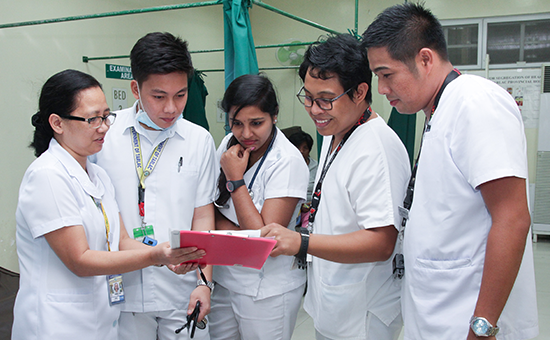
17 Mar New HRH2030 Publications Examine the Pathway to Youth Employment in Health Careers
HRH2030 has published a new technical brief and complementary case study examining the potential that technical and vocational education and training institutions (TVETs) offer to increase the number of youths employed in health careers. The brief, Technical and Vocational Education and Training Institutions: Best Practices and Opportunities to Increase Youth Employment in Health, introduces the HRH2030-developed Youth Employment in Health Framework, which visualizes how to develop optimal partnerships for engaging and preparing youth to become the future health workforce. The case study, Opportunities for Increasing Youth Employment in Health in Indonesia, identifies how educators, employers, and youth themselves can work together to increase the number of youth working in economically empowering health careers.
Youth need meaningful work and the world needs more health workers. The global brief explores opportunities to respond to these needs by creating a stronger ‘win-win’ scenario, using the Youth Employment in Health Framework, which draws on both the World Health Organization (WHO) health labor market framework and USAID’s YouthPower Positive Youth Development framework. HRH2030’s publications explore the best practices for TVETs, including recruiting youth suitable to health careers and collaborating with local employers to foster professional preparedness. They also present employers in the health services with guidance for optimizing and sustaining new graduates in the workforce.
In Indonesia, where 1.7 million youth enter the workforce each year, youth unemployment remains high, despite a growing health sector with many jobs to fill. Educators and employers are uniquely positioned to engage youth’s interest in health careers and, at the same time, foster an enabling environment for careers in health by working with the public and private sectors. TVETs—which offer certification in paraprofessional health cadres as alternatives to four-year institutions, and provide youth with specific, marketable skills, often in a shorter period and at a lower cost—show great promise in working to create opportunities. This case study examines the different types of degrees offered by Indonesia’s public and private TVETs and health-focused high schools (Sekolah Menengah Kejuruan/ Kesehatan (SMK/Health), focusing on two USAID priority geographic areas, JABODETABEK (the cities of Jakarta, Bogor, Depok, Tanggerang, and Bekasi) and South Sulawesi (the cities/districts of Makassar, Maros, and Takalar).
The case study also highlights how TVETs and employers can advocate for policies that help to increase employment for new graduates; develop youth’s soft skills; and replicate successful partnerships to increase the number of internship and other on-the-job experience programs which help improve youth’s skills before they graduate into the job market.
Access the global technical brief here and the case study here. A complete overview of HRH2030’s work with TVETs can be found here, and an overview of our work Indonesia can be found here.





